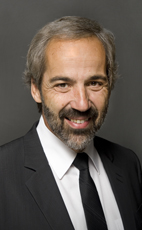Mr. Speaker, he said the complete opposite at a press conference, when he said that passports would not be accepted by the Canadian commission.
Ted Morton said that federal financial institutions tend to be very centralized. With insufficient resources and a lack of autonomy, they will be empty shells.
In Calgary and Montreal, the Minister of Finance's old dream will become our nightmare.
Why does the Conservative government want to deprive Quebec entrepreneurs of a regulator that understands their needs and can speak to them in French?
Why replace the AMF with an answering machine?

